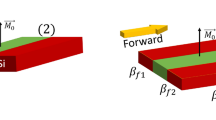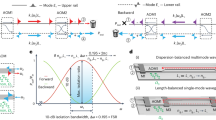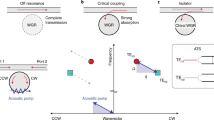Abstract
Optical isolation based on a non-reciprocal effect is crucial for proper operation of several high-performance photonic devices such as in telecommunications, light detection and ranging, and even quantum platforms. The magneto-optical Faraday rotation is the most commonly used non-reciprocal effect as it offers unique advantages, including broadband operation, wide input optical power range, low insertion losses and high optical isolation, but it is currently not conducive to miniaturization. Two major impediments hinder the direct integration of Faraday isolators into photonic chips: the need for bulky external magnets and the challenging fabrication of low-loss waveguides that would eliminate the need for free-space coupling optics. Here we have addressed both challenges using a new femtosecond laser writing technique to create waveguides within the bulk of latched bismuth-doped iron garnet slabs without altering its magneto-optic functionality. As a result, we have achieved a Faraday rotator waveguide exhibiting <0.15 dB insertion loss with a figure of merit of 346° dB−1. By interposing this Faraday rotator between two 30-μm-thick polarizers, we further demonstrate a miniaturized optical isolator waveguide with >25 dB isolation ratio and <1.5 dB insertion loss over the entire optical telecom C-band for hybrid integration to photonic circuits without lenses and external magnet.
This is a preview of subscription content, access via your institution
Access options
Access Nature and 54 other Nature Portfolio journals
Get Nature+, our best-value online-access subscription
$32.99 / 30 days
cancel any time
Subscribe to this journal
Receive 12 print issues and online access
$259.00 per year
only $21.58 per issue
Buy this article
- Purchase on SpringerLink
- Instant access to the full article PDF.
USD 39.95
Prices may be subject to local taxes which are calculated during checkout



Similar content being viewed by others
Data availability
All data supporting the findings of this study are available within the Article and its Supplementary Information. Any additional information can be obtained from the corresponding author on reasonable request.
References
Yang, K. Y. et al. Inverse-designed non-reciprocal pulse router for chip-based LiDAR. Nat. Photon. 14, 369–374 (2020).
Ren, S. Y. et al. Single-photon non-reciprocity with an integrated magneto-optical isolator. Laser Photon. Rev. 16, 2100595 (2022).
Okamura, Y., Ishida, M. & Yamamoto, S. Magnetooptic rib waveguides in YIG: an experiment. Appl. Opt. 23, 124–126 (1984).
Pross, E., Tolksdorf, W. & Dammann, H. Yttrium iron garnet single-mode buried channel waveguides for waveguide isolators. Appl. Phys. Lett. 52, 682–684 (1988).
Wolfe, R., Lieberman, R. A., Fratello, V. J., Scotti, R. E. & Kopylov, N. Etch-tuned ridged waveguide magneto-optic isolator. Appl. Phys. Lett. 56, 426–428 (1990).
Mizumoto, T. & Naito, Y. Non-reciprocal propagation characteristics of YIG thin film. IEEE Trans. Microw. Theory Tech. 30, 922–925 (1982).
Okamura, Y., Negami, T. & Yamamoto, S. Integrated optical isolator and circulator using non-reciprocal phase shifters: a proposal. Appl. Opt. 23, 1886–1889 (1984).
Du, Q. et al. Monolithic on-chip magneto-optical isolator with 3 dB insertion loss and 40 dB isolation ratio. ACS Photon. 5, 5010–5016 (2018).
Mizumoto, T., Oochi, K., Harada, T. & Naito, Y. Measurement of optical non-reciprocal phase shift in a Bi-substituted Gd3Fe5O12 film and application to waveguide-type optical circulator. J. Light. Technol. 4, 347–352 (1986).
Bi, L., Hu, J., Dionne, G. F., Kimerling, L. & Ross, C. A. Monolithic integration of chalcogenide glass/iron garnet waveguides and resonators for on-chip non-reciprocal photonic devices. In Integrated Optics: Devices, Materials, and Technologies XV 7941, 28–37 (SPIE, 2011).
Sun, X. Y. et al. Single-step deposition of cerium-substituted yttrium iron garnet for monolithic on-chip optical isolation. ACS Photon. 2, 856–863 (2015).
Zhang, C., Dulal, P., Stadler, B. J. & Hutchings, D. C. Monolithically-integrated TE-mode 1D silicon-on-insulator isolators using seedlayer-free garnet. Sci. Rep. 7, 5820 (2017).
Mizumoto, T., Baets, R. & Bowers, J. E. Optical non-reciprocal devices for silicon photonics using wafer-bonded magneto-optical garnet materials. MRS Bull. 43, 419–424 (2018).
Pintus, P. et al. Broadband TE optical isolators and circulators in silicon photonics through Ce:YIG bonding. J. Light. Technol. 37, 1463–1473 (2019).
Shoji, Y. & Mizumoto, T. Silicon waveguide optical isolator with directly bonded magneto-optical garnet. Appl. Sci. 9, 609 (2019).
Shoji, Y., Mizumoto, T., Yokoi, H., Hsieh, I. W. & Osgood, R. M. Magneto-optical isolator with silicon waveguides fabricated by direct bonding. Appl. Phys. Lett. 92, 071117 (2008).
Huang, D. et al. Electrically driven and thermally tunable integrated optical isolators for silicon photonics. IEEE J. Quantum Electron. 22, 271–278 (2016).
Stadler, B. J. & Mizumoto, T. Integrated magneto-optical materials and isolators: a review. IEEE Photon. J. 6, 1–15 (2013).
Srinivasan, K. & Stadler, B. J. Review of integrated magneto-optical isolators with rare-earth iron garnets for polarization diverse and magnet-free isolation in silicon photonics. Opt. Mater. Express 12, 697–716 (2022).
Shoji, Y. & Mizumoto, T. Magneto-optical non-reciprocal devices in silicon photonics. Sci. Technol. Adv. Mater. 15, 014602 (2014).
Srinivasan, K. & Stadler, B. J. Magneto-optical materials and designs for integrated TE- and TM-mode planar waveguide isolators: a review. Opt. Mater. Express 8, 3307–3318 (2018).
Yamaguchi, R., Shoji, Y. & Mizumoto, T. Low-loss waveguide optical isolator with tapered mode converter and magneto-optical phase shifter for TE mode input. Opt. Express 26, 21271–21278 (2018).
Ghosh, S. et al. Optical isolator for TE polarized light realized by adhesive bonding of Ce:YIG on silicon-on-insulator waveguide circuits. IEEE Photon. J. 5, 6601108–6601108 (2013).
Zhang, Y. et al. Monolithic integration of broadband optical isolators for polarization-diverse silicon photonics. Optica 6, 473–478 (2019).
Huang, D., Pintus, P. & Bowers, J. E. Towards heterogeneous integration of optical isolators and circulators with lasers on silicon. Opt. Mater. Express 8, 2471–2483 (2018).
Yan, W. et al. Waveguide-integrated high-performance magneto-optical isolators and circulators on silicon nitride platforms. Optica 7, 1555–1562 (2020).
Levy, M. et al. Integrated optical isolators with sputter-deposited thin-film magnets. IEEE Photon. Technol. Lett. 8, 903–905 (1996).
Huang, D. et al. Integrated broadband Ce:YIG/Si Mach–Zehnder optical isolators with over 100 nm tuning range. Opt. Lett. 42, 4901–4904 (2017).
Huang, D. et al. Dynamically reconfigurable integrated optical circulators. Optica 4, 23–30 (2017).
Tzuang, L. D., Fang, K., Nussenzveig, P., Fan, S. & Lipson, M. Non-reciprocal phase shift induced by an effective magnetic flux for light. Nat. Photon. 8, 701–705 (2014).
Fang, K. et al. Generalized non-reciprocity in an optomechanical circuit via synthetic magnetism and reservoir engineering. Nat. Phys. 13, 465–471 (2017).
Kim, S., Sohn, D. B., Peterson, C. W. & Bahl, G. On-chip optical non-reciprocity through a synthetic Hall effect for photons. APL Photon. 6, 011301 (2021).
Dostart, N., Gevorgyan, H., Onural, D. & Popović, M. A. Optical isolation using microring modulators. Opt. Lett. 46, 460–463 (2021).
Kim, J. H., Kuzyk, M. C., Han, K., Wang, H. & Bahl, G. Non-reciprocal Brillouin scattering induced transparency. Nat. Phys. 11, 275–280 (2015).
Kittlaus, E. A., Otterstrom, N. T., Kharel, P., Gertler, S. & Rakich, P. T. Non-reciprocal interband Brillouin modulation. Nat. Photon. 12, 613–619 (2018).
Kittlaus, E. A. et al. Electrically driven acousto-optics and broadband non-reciprocity in silicon photonics. Nat. Photon. 15, 43–52 (2021).
Sohn, D. B., Örsel, O. E. & Bahl, G. Electrically driven optical isolation through phonon-mediated photonic Autler–Townes splitting. Nat. Photon. 15, 822–827 (2021).
Lira, H., Yu, Z., Fan, S. & Lipson, M. Electrically driven non-reciprocity induced by interband photonic transition on a silicon chip. Phys. Rev. Lett. 109, 033901 (2012).
Sohn, D. B., Kim, S. & Bahl, G. Time-reversal symmetry breaking with acoustic pumping of nanophotonic circuits. Nat. Photon. 12, 91–97 (2018).
Tian, H. et al. Magnetic-free silicon nitride integrated optical isolator. Nat. Photon. 15, 828–836 (2021).
White, A. D. et al. Integrated passive nonlinear optical isolators. Nat. Photon. 17, 143–149 (2023).
Del Bino, L. et al. Microresonator isolators and circulators based on the intrinsic non-reciprocity of the Kerr effect. Optica 5, 279–282 (2018).
Shi, Y., Yu, Z. & Fan, S. Limitations of nonlinear optical isolators due to dynamic reciprocity. Nat. Photon. 9, 388–392 (2015).
Abbott, R. R., Fratello, V. J., Licht, S. J. & Mnushkina, I. Article comprising a Faraday rotator that does not require a bias magnet. US patent 6,770,223 (2004).
Karki, D., Stenger, V., Pollick, A. & Levy, M. Thin-film magnetless Faraday rotators for compact heterogeneous integrated optical isolators. J. Appl. Phys. 121, 23 (2017).
Karki, D., Stenger, V., Pollick, A. & Levy, M. Broadband bias-magnet-free on-chip optical isolators with integrated thin film polarizers. J. Light. Technol. 38, 827–833 (2020).
Gattass, R. R. & Mazur, E. Femtosecond laser micromachining in transparent materials. Nat. Photon. 2, 219–225 (2008).
Lapointe, J. et al. Nonlinear increase, invisibility, and sign inversion of a localized fs-laser-induced refractive index change in crystals and glasses. Light Sci. Appl. 9, 64 (2020).
Fakhrul, T. et al. High figure of merit magneto-optical Ce- and Bi-substituted terbium iron garnet films integrated on Si. Adv. Opt. Mater. 9, 2100512 (2021).
Zhou, Z. et al. Prospects and applications of on-chip lasers. eLight 3, 1–25 (2023).
Tan, J. Y., Wu, S. X., Salih, Y., Li, C. & Lo, G. Q. Foundry’s perspective on laser and SOA module integration with silicon photonics. J. Light. Technol. 42, 1062 (2023).
Magneto-Optic LPE Garnet Faraday Rotator Crystals. https://www.coherent.com/content/dam/coherent/site/en/resources/datasheet/optics/magneto-optic-lpe-garnet-faraday-rotator-crystals-ds.pdf (II-VI Inc., 2023).
Shah, L., Arai, A. Y., Eaton, S. M. & Herman, P. R. Waveguide writing in fused silica with a femtosecond fiber laser at 522 nm and 1 MHz repetition rate. Opt. Express 13, 1999–2006 (2005).
Chambonneau, M. et al. In-volume laser direct writing of silicon—challenges and opportunities. Laser Photon. Rev. 15, 2100140 (2021).
Chen, F. & de Aldana, J. V. Optical waveguides in crystalline dielectric materials produced by femtosecond-laser micromachining. Laser Photon. Rev. 8, 251–275 (2014).
Lapointe, J. et al. Laser writing of 3D waveguides up to long-wave infrared: sensing and high refractive index contrast challenges. In Laser Applications in Microelectronic and Optoelectronic Manufacturing (LAMOM) XXVII 11988, 78–93 (SPIE, 2022).
Bérubé, J. P., Lapointe, J., Dupont, A., Bernier, M. & Vallée, R. Femtosecond laser inscription of depressed cladding single-mode mid-infrared waveguides in sapphire. Opt. Lett. 44, 37–40 (2019).
Dupont, A., Lapointe, J., Pouliot, S. & Vallée, R. From near-UV to long-wave infrared waveguides inscribed in barium fluoride using a femtosecond laser. Opt. Lett. 46, 3925–3928 (2021).
Peng, Y. P. et al. Mid-infrared laser emission from Cr:ZnS channel waveguide fabricated by femtosecond laser helical writing. Sci. Rep. 5, 18365 (2015).
Caulier, O., Le Coq, D., Bychkov, E. & Masselin, P. Direct laser writing of buried waveguide in As2S3 glass using a helical sample translation. Opt. Lett. 38, 4212–4215 (2013).
Zhang, Y. J. et al. Double line and tubular depressed cladding waveguides written by femtosecond laser irradiation in PTR glass. Opt. Mater. Express 7, 2626–2635 (2017).
Salamu, G., Jipa, F., Zamfirescu, M. & Pavel, N. Cladding waveguides realized in Nd:YAG ceramic by direct femtosecond-laser writing with a helical movement technique. Opt. Mater. Express 4, 790–797 (2014).
Marcuse, D. Loss analysis of single-mode fiber splices. Bell Syst. Tech. J. 56, 703–718 (1977).
Santos, S. N. C. D. et al. Femtosecond-laser fabrication of magneto-optical waveguides in terbium doped CaLiBO glass. Opt. Mater. 126, 112197 (2022).
Polarcor™ UltraThin™ Glass Polarizers Product Information. https://www.corning.com/media/worldwide/csm/documents/Polarcor%E2%84%A2%20Ultrathin%E2%84%A2%20Product%20Information%20Sheet.pdf (Corning Inc., 2005).
Kaur, P. et al. Hybrid and heterogeneous photonic integration. APL Photon. 6, 061102 (2021).
Billah, M. R. et al. Hybrid integration of silicon photonics circuits and InP lasers by photonic wire bonding. Optica 5, 876–883 (2018).
Hélie, D., Gouin, S. & Vallée, R. Assembling an endcap to optical fibers by femtosecond laser welding and milling. Opt. Mater. Express 3, 1742–1754 (2013).
Lapointe, J., Bérubé, J. P., Dupont, A., Bellec, M. & Vallée, R. Modified astigmatic beam technique for laser writing. Appl. Opt. 61, 2333–2337 (2022).
Roberts, A. et al. Refractive-index profiling of optical fibers with axial symmetry by use of quantitative phase microscopy. Opt. Lett. 27, 2061–2063 (2002).
Acknowledgements
This research project was funded by the Evolution of Cloud Services in the Quebec-Ontario Corridor for Research and Innovation (ENCQOR) programme under contract reference number IBM-Codev-AEPONYX-1. We acknowledge the contribution of their funding partners IBM CANADA Ltd. and AEPONYX Enterprises Inc. for their valuable and seeding support. Special thanks are addressed to B. A. Janta-Polczynski from IBM for the seminal discussions and ideas, to D. Menard from Polytechnique Montreal for the discussions on magnetism, to S. Subramanian from Coherent-II-VI for the valuable insight and perspective into the BIG material properties, and to S. Gagnon for his valuable technical expertise.
Author information
Authors and Affiliations
Contributions
J.L., C.C. and R.V. designed the optical isolator. J.L. and R.V. developed the laser writing technique. J.L. performed numerical simulations. J.L. built the experimental set-up. J.L. and A.D. fabricated the waveguides and optical isolators. J.L. and A.D. conducted the optical measurements. All authors contributed to the analysis of the results. J.L., C.C. and R.V. contributed to writing the paper. R.V. and C.C. supervised the project.
Corresponding author
Ethics declarations
Competing interests
C.C. is employed by AEPONYX Enterprises Inc., an active funder of the project. The work presented in this paper has been filed for provisional US patent application under number 63/363,730 and for Patent Cooperation Treaty application under number CA2023050273 by AEPONYX Enterprises Inc., with J.L., C.C., P. Babin, D. Michel, R.V., M. Bérard and A. Fekecs as inventors. The patent is currently pending national entry phase. The other authors declare no competing interests.
Peer review
Peer review information
Nature Photonics thanks the anonymous reviewers for their contribution to the peer review of this work.
Additional information
Publisher’s note Springer Nature remains neutral with regard to jurisdictional claims in published maps and institutional affiliations.
Supplementary information
Supplementary Information
Supplementary Figs. 1–4 and Sections 1–4.
Supplementary Video 1
Video of a 1,550 nm laser being injected into a waveguide inscribed by a femtosecond laser in a BIG slab using an optical fibre, demonstrating strong optical mode confinement.
Supplementary Video 2
Video of a BIG slab with magnetic domains observed through two polarizers offset by 45°. By moving a magnet around the piece of BIG, the movement of the magnetic domains is observed. When the magnet is brought within a few millimetres above the slab, the BIG is latched, and the magnetic domains are no longer visible.
Rights and permissions
Springer Nature or its licensor (e.g. a society or other partner) holds exclusive rights to this article under a publishing agreement with the author(s) or other rightsholder(s); author self-archiving of the accepted manuscript version of this article is solely governed by the terms of such publishing agreement and applicable law.
About this article
Cite this article
Lapointe, J., Coia, C., Dupont, A. et al. Passive broadband Faraday isolator for hybrid integration to photonic circuits without lens and external magnet. Nat. Photon. 19, 248–257 (2025). https://doi.org/10.1038/s41566-024-01601-0
Received:
Accepted:
Published:
Version of record:
Issue date:
DOI: https://doi.org/10.1038/s41566-024-01601-0
This article is cited by
-
Characteristics in enhanced well and optical barrier waveguides on Dy:LPS crystals
Journal of Materials Science: Materials in Electronics (2026)
-
Femtosecond laser writes a broadband miniaturized isolator
Nature Photonics (2025)



